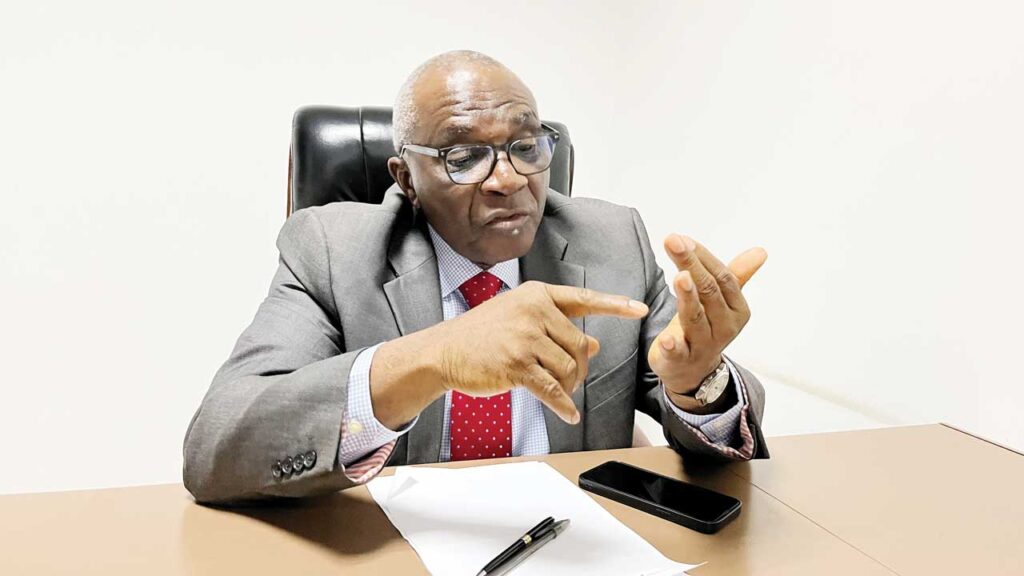In this interview with Weekend Trust, Bayo Onanuga, the special adviser to President Bola Ahmed Tinubu on information and strategy, spoke on the administration’s economic policies, security efforts, cabinet performance and the delay in appointing ambassadors, among other issues.
Two years into the administration but barely a year before the official commencement of the 2027 election campaign season, Nigerians still complain of hunger. Is there a silver bullet in sight for the economy? Any plan to re-jig macroeconomic policies?
Nobody can take away the credit this administration has earned regarding how it has re-jigged the economy. People sometimes forget where we were coming from. I was in this country in May 2023 and saw firsthand what was happening, even if many had forgotten. There was fuel scarcity nationwide. At the time, the NNPC was the sole importer of fuel and had reached a breaking point.
SPONSOR AD
The company was groaning. It said it could no longer afford to import fuel. It later emerged that the NNPC owed its suppliers between five and six billion dollars. It was lifting refined fuel on credit and couldn’t pay its suppliers because it was essentially supplying Nigerians with fuel almost free — it wasn’t recovering its costs.
People should also not forget that removing subsidies was a structural necessity. The Buhari administration had already terminated the fuel subsidy by the end of June 2023 in its 2023 budget. So when President Tinubu declared that “fuel subsidy is gone,” it was about that inherited policy reality. The subsidy regime could no longer continue as it was.
What happened next was immediate: the NNPC, the sole importer and supplier quickly adjusted pump prices, triggering widespread price increases across sectors. One newspaper rightly described it as “shock therapy.” But there was simply no way Nigeria could continue sustaining the fuel subsidy.
As I said, the NNPC had already reached its limit. It was no longer viable for the company to continue under a pricing regime that offered no cost recovery. The government had no other option but to act — to remove the subsidy and restructure the fuel pricing system.
Since liberalising fuel prices, have you heard of fuel scarcity? No. Fuel is now available, and more players have entered the market. New refineries are springing up because the pricing structure is now viable. They can refine in Nigeria and recover their costs.
The old paradigm where the government subsidised fuel was unsustainable. Today, several companies are entering the space. I believe BUA is also progressing with its refinery project. We also have smaller players — modular refineries ramping up operations. The sector has been liberalised and Nigerians are now paying the appropriate market price for fuel.
Even with that, we still have the cheapest petrol when you compare Nigeria to the rest of West Africa. That’s why smuggling continues. In places like Niger, Benin, Cameroon and Ghana, the fuel price is more than double what it is here. In Nigeria, we still enjoy the lowest prices.
Last week, I checked global fuel prices and saw that Saudi Arabia sells a litre at 50 to 60 cents, similar to what we pay here. So, it is incorrect to say that our fuel is expensive. As the president has consistently said, we cannot keep spending the wealth of future generations to subsidise consumption today. There would be nothing left for them. That’s why that decision had to be made.
The other major economic reform was the harmonisation of exchange rates. Even domestic economists warned that maintaining three or four exchange windows was unsustainable. We had to harmonise.
After removing the subsidy, the president took the bold step of ending distortions in the forex market. Today, to the credit of this administration, you can sometimes buy dollars at the parallel market at less than the official rate. If you check the BDC rate, you may find that it is lower than the CBN rate. That never used to happen.
Previously, the government subsidised the dollar, allowing some privileged individuals — just because they had access to the CBN governor or insiders — to buy forex cheaply and then make massive profits through arbitrage. That’s how billionaires were created without doing anything productive. But that’s no longer possible.
After initial volatility, exchange rates have largely stabilised. Even though there is still a gap between the official and parallel market rates, the difference is nothing like the N400 gulf we once had. The harmonisation has worked.
Look at the results: Foreign direct investment has increased and more money flows into the real economy and the stock market. None of that would have happened if we hadn’t taken these bold steps. Investors now see that this administration is serious about reforms.
People abroad often appreciate our economic reforms more than we do at home. When they praise the government’s actions, it is not flattery — they have studied our economy and seen that the right policies are finally being implemented.
This government has corrected several macroeconomic distortions in the last two years, and the gains are now becoming evident. For example, the balance of payments has shown positive trends for five or six consecutive quarters. Gross domestic product has also recorded sustained growth.
Let’s look at internally generated revenue. By the end of the first quarter, the Federal Inland Revenue Service collected about N6 trillion—a record. According to the records, it may surpass the N25 trillion target set for this year, with the NNPC now making increased contributions to the treasury. That shows clearly that the reforms are working.
Even at the sub-national level, states get higher allocations from the federation account, enabling them to invest more in infrastructure and development. I remember the governor of Kwara saying at a public function in December that he had done more public works in the last year and a half under President Tinubu than in his first four years in office.
On Thursday, the president visited Kaduna to commission projects completed by the state government. Previously, most states barely had enough to pay salaries. Now, there is a surplus. Governors are investing in infrastructure, agriculture and other productive sectors.
As you rightly said, these developments are visible. Nigerians can see them, but for the ordinary Nigerian who used to buy bread at N200 and now pays N800, when will they begin to feel the impact of these reforms? When will the promised benefits start reaching them?
When the government implemented the two major policy reforms — fuel subsidy removal and exchange rate unification — there were bound to be economic shocks. The government recognised that and responded. That’s why, around October 2023, it declared a state of emergency on food security and announced plans to cultivate about 500,000 hectares of land for various food crops.
The idea was for state governments to participate in this initiative since the federal government has no land. Unfortunately, only a few did. Jigawa came on board; and I think Niger also participated. The results from Jigawa, for instance, showed significant improvement in output, which showed that the plan worked. Since then, the federal government has prioritised measures to bring down the cost of food, but it is still a significant challenge. Next week, the president will launch about 2000 tractors to boost mechanised farming.
One reason for persistently high food prices is the role of middlemen. Many buy food from farmers at fair prices in rural areas, then bring it to urban centres and increase prices excessively.
Let me give you a personal example. I was in Lagos recently and bought a crate of eggs. I didn’t even check the price until I was about to leave and I was told it cost N10,000. I asked my driver if that could be right. He wasn’t sure as he doesn’t usually buy egg crates. But when I returned to Abuja and purchased the same crate at the fruit market in Maitama, it cost N6,000.
The Lagos supermarket ripped me off. This sort of arbitrary price fixing by retailers is making life harder for ordinary Nigerians. I have also seen cases where people say, “Oh, the dollar is now N1,500,”
and immediately raise prices — even when the product has nothing to do with imported content.
That kind of behaviour is a key driver of inflation. But as far as the government is concerned, efforts are being made to ease the burden where it matters most — food and medicine. The National Bureau of Statistics reported a decline in food inflation in the last two months. That shows things are beginning to stabilise.
The government also imports agricultural machinery, including tractors and harvesters, to promote mechanised farming. We are moving away from the traditional hoe-and-cutlass approach. The goal is to encourage states and stakeholders in the agricultural sector to scale up mechanised farming—real industrial agriculture.
Last year, and even into this year, the government approved the limited importation of food items. That decision helped push down food prices. Some critics said this would hurt local producers. But the reality is that when prices rise beyond what people can afford, the government cannot just fold its arms. That’s not price control — it’s intervention. Increasing supply will naturally lead to lower prices in a basic supply-demand context.
But beyond that, there are also Nigerians who speculate on food prices. I know of a driver who invested N5 million in beans hoping that prices would rise. He lost over N2 million when prices crashed and couldn’t find buyers. That’s what speculation does. And it is part of our problem — some people are trying to exploit the system rather than support it.
There was a viral video recently of a monarch in Ekiti who went out to confront traders in the market, questioning why their prices were three times higher than what they paid the suppliers. Of course, everyone wants to make a profit, but when you are making 300 per cent margins, that’s exploitation. It is profiteering and criminal. So yes, part of the problem lies with us, Nigerians — some of us began profiteering as soon as the reforms kicked in.
The government responded by boosting supply, which forced prices down. Look at the oil sector. When deregulation began, prices rose sharply, as high as N1,200 per litre, but now, they have dropped to below N900. And Aliko Dangote’s recent intervention—deploying 4,000 trucks to distribute petrol at zero transportation cost—will push prices further down.
Each time a new price is announced — say, N875 in Lagos and N895 in Abuja — you can see that the cost of transporting fuel from Lagos to Abuja is about N20 per litre. If you remove that cost, prices will drop.
Several efforts are being made to reduce the pressure on Nigerians. I read today that Dangote offered free fuel transportation to help fight inflation. Moves like that will reduce traders’ temptation to arbitrarily increase prices under the pretext of high transport costs.
Beyond food and fuel, the government is also targeting medicine. Just last month, the Federal Executive Council approved the establishment of a “Medipool” — a central system for bulk procurement of essential drugs. The idea is to import medicines in large quantities and ensure they are distributed to Nigerians at affordable rates.
This will provide relief to many, especially those with chronic health conditions. I have seen people complain about the rising cost of asthma medication. But with this intervention, prices will fall and essential medicines will become more accessible
From what you have said so far, it seems clear that the president is confident in his economic policies and has no intention of re-jigging them; is that correct?
The economy has two key aspects — the macro and the micro. On the macroeconomic front, we are on solid footing. There’s no need to re-jig policies that are already yielding results. If you have a team that keeps scoring goals, why would you want to change that team?
That’s essentially what the president has done. The macroeconomic policies are working and producing positive results.
Food inflation remains a pressing concern on the microeconomic side. Many attribute the problem of food insecurity to the insecurity in Nigeria’s major food-producing zones. Just last week, there was another violent incident in Benue. We have also seen cases in Niger, Kebbi and Zamfara — states that are critical to agricultural output. When the president visited Benue, he asked the Inspector-General of police and the Chief of Defence Staff why no one had been arrested concerning that incident. Given the president’s prior directives and worsening insecurity, is there any performance appraisal system for the security chiefs?
As a journalist myself, I see reports of security breaches — kidnappings in Zamfara, Sokoto and so on. But I also receive reports on the progress being made by our security men. I often read about operations where security forces rescued kidnapped victims or neutralised insurgents.
Just yesterday (Wednesday) or today (Thursday), there were reports that many insurgents were killed in an operation. The problem is that we in the media often highlight negative stories more than positive ones. We rarely credit our soldiers and police officers when they succeed.
Statistically, security has improved under this administration. That’s just a fact. However, people will naturally focus on every new incident, and that can make it feel like nothing has changed. I don’t want to sound morbid, but if you compare the level of violence now to what we had before, things are relatively better.
Of course, this doesn’t mean that the government is satisfied whenever there’s a flare-up or incident. You can see that from how the president reacted in Benue. He challenged the security leadership, urging them to sharpen their strategies to ensure the safety of citizens.
Does that mean the president is satisfied with the performance of the security chiefs despite ongoing killings and kidnappings reported almost daily?
No one wants these incidents to continue. The goal is for security to improve significantly. The president consistently encourages security agencies to do better and ensure that all Nigerians can sleep peacefully at night, no matter where they live.
Let me give you an example. In 2023 during the campaign period, President Tinubu visited Birnin Gwari in Kaduna State. It was a dangerous area at the time. He arrived late at night, and the convoy included about 30 to 40 armoured tanks to ensure safety on the Kaduna–Birnin Gwari road. But today, the situation has changed. Farmers have returned to their fields. You can now drive from Kaduna to Birnin Gwari without a police escort. Our soldiers and police officers have made the road safe again and people travel freely.
Take the Abuja–Kaduna highway as another example. A few years ago, most Nigerians were terrified to travel that route due to incessant attacks, but today, people are using that road regularly. Just yesterday (Wednesday), I travelled from Abuja to Makurdi by road, passing through some previously volatile areas like Yelewata, where killings occurred recently. We encountered no incidents. We even travelled at night without any security escort on our return journey, which indicates that the security situation has improved when compared to the past.
Can we say the same about the president’s cabinet? At the inauguration, he spoke of regular assessments; is that process still ongoing?
Yes, ministers are assessed regularly. A special adviser monitors ministerial performance and updates the president on each ministry’s progress—what has been done, what’s pending and areas that need attention.
So, yes, the assessment process is ongoing despite some misguided media reports about the ministers’ performance. Reviews are done continuously.
Should Nigerians expect a cabinet reshuffle anytime soon?
As far as I know, the president is satisfied with the performance of his ministers. If he wasn’t, he would have asked them to leave.
He receives performance reports from each ministry, so he knows what is happening and what action is needed, if any.
What is the situation with the ambassadorial list?
The last time I spoke with the foreign affairs minister, he confirmed that the president had the list. The list will be out soon.
Some people are concerned that the delay in appointing ambassadors could affect Nigeria’s foreign policy; don’t you think so?
That’s not entirely accurate. All our foreign missions currently have chargés d’affaires carrying out ambassadors’ duties.
The president and the foreign affairs minister have also remained the principal faces of Nigeria’s foreign policy. The absence of ambassadors does not mean we are not engaging with other countries. Many of those countries have ambassadors here in Nigeria, so diplomatic relations continue.
Do you want to share a story with us? Do you want to advertise with us? Do you need publicity for a product, service, or event? Contact us on WhatsApp +2348183319097 Email: platformtimes@gmail.com
We are committed to impactful investigative journalism for human interest and social justice. Your donation will help us tell more stories. Kindly donate any amount HERE






